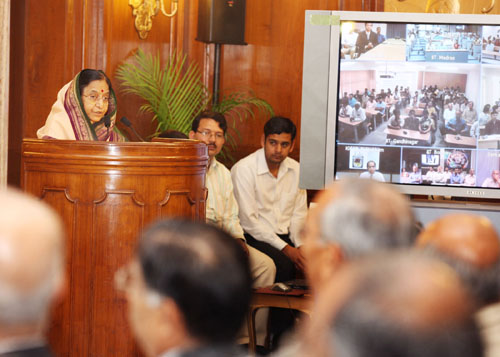Speech by Her Excellency the President of India, Shrimati Pratibha Devisingh Patil, at the Inauguration of the Initial Phase of the National Knowledge Network (Nkn)
Rashtrapati Bhavan, New Delhi : 09.04.2009

I am extremely pleased to inaugurate the initial phase of the National Knowledge Network or the NKN.
The connectivity provided by Information and Communication Technology - ICT has played a pivotal role in linking people, institutions and regions within the country and globally. ICT has played an important role in the progress of the country. It has increased the access of ICT users to a wider pool of knowledge, which is now available online. This has definitely helped doctors, scientists, professionals, scholars and students. It has not only helped those, but also farmers or fishermen in villages to update themselves on markets and meteorological data. Flow of information is useful and, initiatives like the National Knowledge Network are a significant step towards ushering in a knowledge revolution in the country.
In recent times, our country has gained global recognition for its IT and IT-enabled Services industry. We are regarded as a major IT power. It is imperative to leapfrog to the next stage and build further on this leadership position and build a knowledge economy. The need is to facilitate and further energize the scientific and research community in the country to continue to innovate and contribute to the diverse sectors of our economy.
The National Knowledge Network provides a platform to bring together all stakeholders - scientists, researchers and students from different backgrounds and diverse geographies - to work closely for faster development in critical and emerging areas. This network will make it possible to share knowledge without constraints of distance, time and physical location. I have recently returned from a visit to some of our North Eastern states. There, I found great scope for the use of Information Technology for making geography irrelevant by the online sharing of experiences and best practices. The Network is, indeed, a revolutionary step towards creating a knowledge society without boundaries.
Today, the core backbone of the NKN is ready for use by a large number of organizations, such as the IITs, the Babha Atomic Research Centre and the Indira Gandhi Centre for Atomic Research in areas of strategic research. While its application must definitely be in areas of high end research, it should also be employed at the lower end of the pyramid, so that all citizens can benefit.
Around 70 percent of our population is living in villages and dependent on agriculture for meeting their day-to-day needs. This sector should obviously be a major thrust area for research and content creation. For example, the Indian Council for Agricultural Research may require some data and inputs for its work for creating better yielding seeds or crop protection. It is very much possible that other institutions may be doing the same work in this field. The pooling of knowledge and efforts would fulfill the long felt need for synergy in the pursuit of innovation and encourage collaborative research.
The NKN can also play a major role in Healthcare by facilitating Telemedicine and medical education. Medical and related sciences have experienced exponential development of knowledge and techniques. It is almost impossible for any medical library to store and constantly update such huge knowledge databases. The NKN will be able to address this concern. This network facility will also enable country-wide class rooms to be conducted. This will be especially useful where there is a severe shortage of trained faculty. A lecture by a professor in one IIT institute could be heard by all institutions connected with this network. The optimum utilization of the intellectual resources of our country and interaction between various institutions would develop a spirit of camaraderie, so essential to build strong teams of scholars and researchers.
Global R&D applications, unlike in the past, are becoming more collaborative and R&D activities are not limited to a few developed countries. The NKN will now provide a high speed gateway to connect to other similar initiatives worldwide and allow India to join the next generation network. International connectivity of the NKN will also facilitate collaborative research at the international level in specialized areas like Bio-technology, genetics, energy systems, weather, eco-friendly technologies, among others.
The National Knowledge Network if harnessed effectively can be a critical infrastructure for India to evolve as a Knowledge Society. I am confident that our talented work force will continue to sustain the knowledge revolution and their work will be for the welfare of humanity, which is the highest aim of both knowledge and science. Technology has a role in transforming society and for promoting inclusive growth. ICT expansion must be undertaken in such a manner that it bridges the digital gap.
With these words, I inaugurate the first phase of the National Knowledge Network. I hope that the next phase will be completed early in a time bound manner. I convey my good wishes and best of luck to all of you.
Thank you.
Jai Hind.
